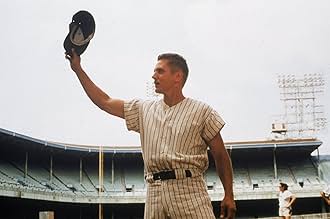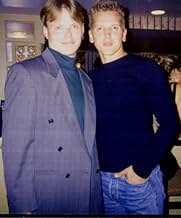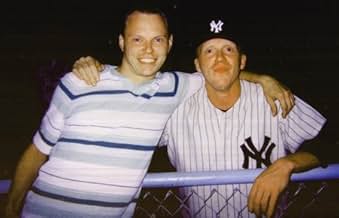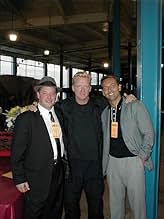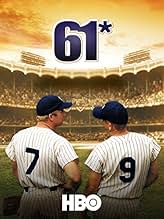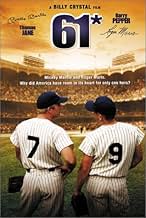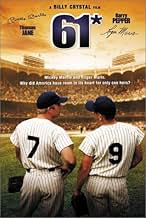CALIFICACIÓN DE IMDb
7.7/10
18 k
TU CALIFICACIÓN
Agrega una trama en tu idiomaRoger Maris and Mickey Mantle race to break Babe Ruth's single-season home run record.Roger Maris and Mickey Mantle race to break Babe Ruth's single-season home run record.Roger Maris and Mickey Mantle race to break Babe Ruth's single-season home run record.
- Ganó 2 premios Primetime Emmy
- 4 premios ganados y 26 nominaciones en total
- Dirección
- Guionista
- Todo el elenco y el equipo
- Producción, taquilla y más en IMDbPro
Argumento
¿Sabías que…?
- TriviaBecause there was no accurate documentation of it, no one knew what the precise color of the Yankee Stadium seats were in 1961. When faced with this dilemma, production designer Rusty Smith was told that Billy Crystal had an old bleacher seat from Yankee Stadium. Though the seat was completely painted blue, Smith found one small chip of green on the seat that proved to be the true Yankee Stadium green.
- ErroresWhen Maris is talking with his wife from a payphone after the birth of their son, he's talking on a payphone that is a single-slot model. In 1961, the three slot version (25 cent, 10 cent 5 cent) was still in use. The single-slot phone was not introduced until 1965.
- Créditos curiososYankee Stadium played by Tiger Stadium
- Bandas sonorasDream Lover
Written and Performed by Bobby Darin
Courtesy of Atco Records
By Arrangement with Warner Special Products
Opinión destacada
Being 33 years old as of this writing, I knew little about the Roger Maris-Mickey Mantle home run chase of 1961 until the Mark McGwire-Sammy Sosa home run chase of 1998. I didn't learn a whole lot about the '61 chase in '98 but I learned enough to develop a solid interest in it.
Still, I didn't have very high hopes for "61*." Most of the made for TV movies that I've seen haven't made a strong impression on me, including those made for cable TV, as this was (for HBO). Furthermore, I've never been a big Billy Crystal fan. Though I love comedy, I've never found him to be that funny. And I didn't have a lot of confidence in him to make a good drama, either.
And on top of all that, I often find sports biography movies to be disappointing, often leaving out important details while at the same time over-Hollywoodizing. "Rudy," for example. But when I saw the DVD of "61*" at a Family Dollar store, priced at just $6, I took a chance and bought it. And I'm glad I did!
Crystal won tremendous respect from me with this movie. Almost flawlessly, he tells one of the most interesting single season sports stories that I know of. And I know of more than probably 99% of the American population!
From the start, the 1961 Major League Baseball season was ripe to be a classic. Babe Ruth's single season home run record of 60, set in 1927, was more vulnerable than ever because of two major changes. The Los Angeles (later California and now Anaheim) Angels and Washington Senators (now Texas Rangers) began play, thus spreading the pitching talent more thinly. And the regular season increased in length from 154 games - which had also been the season length in 1927 - to 162, as it remains today.
The biggest reason why I find the '61 chase more interesting than the '98 chase is that in '61, the top two contenders were teammates. Both played for - who else - the New York Yankees. One was Mickey Mantle (played by Thomas Jane), who had already spent a decade with the Yankees and was unquestionably the biggest star of the day. The other was Roger Maris (Barry Pepper), who was much less heralded. Maris had just emerged as a star the year before, winning the American League Most Valuable Player award in his Yankees debut, which followed three solid but unspectacular years with other Major League teams.
Both Mantle and Maris hailed from rural states - Oklahoma and North Dakota, respectively - but were very different people. Mantle epitomized the word "superstar." Besides excelling at every area of the game, he was a charismatic, care free party animal and a fan favorite, the natural heir to Babe Ruth, Lou Gehrig, Joe DiMaggio and other legends. In sharp contrast, Maris was an introvert who largely shunned the spotlight. He loved the game but never attempted to be what the media and fans wanted him to be.
(On a side note, I'm a Maris sympathizer because I can relate to being rejected by people who I don't bother simply because I don't follow the crowd and I believe in judging people based on substance more than anything else. Yankees fans should have loved Maris and embraced his phenomenal achievement that year.)
As the season progressed and both Mantle and Maris stayed near the pace to break Ruth's record, it was obvious that the fans favored Mantle by far. And when Mantle was slowed by injuries, the fans generally ranged from lukewarm to hostile in their treatment of Maris as he neared the record. For example, the Yankees' last game of the regular season, which they hosted, drew a crowd of just 22,000 even though Maris entered the game tied with Ruth and even though the Yankees went on to win the World Series that year.
This is a sharp contrast to 1998, when McGwire regularly filled stadiums in pursuit of Maris' record even though McGwire's team didn't even make the playoffs that season. And in sharp contrast to McGwire's enthusiasm for breaking the record, Maris did not seem to get a lot of joy out of it. He had a difficult time dealing with negativity from the media and fans and also missed the birth of a son during the season.
There are so many things to love about "61*" that it's hard to list them all. The movie does a great job recreating 1961 in every way. Crystal even managed to find actors to play not only most of the significant Yankees of the season but also many of their opponents. That is not the case with most sports biography movies.
Pepper and Jane both give excellent performances and strongly resemble the men who they play. And the movie is very fair and balanced. It presents the perspectives of both Mantle and Maris and gives us an up close look at their relationship behind the scenes, which was fairly good, all things considered. Mantle even moved in with Maris during the season.
The movie doesn't white wash either man, neither of whom was squeaky clean, but it doesn't resort to sensationalism, either. For example, it shows Mantle drink alcohol enough in the movie that we realize he drank too much alcohol, but it doesn't dwell on that fact. In addition, the movie gives us insight into Mantle's philosophy. The men in his family all died by the age of 45 so he figured he wasn't going to live a long life and therefore didn't see a need to take good care of himself.
(Shortly before his death from cancer in 1995 at the age of 63, he acknowledged that he would have taken care of himself had he known that he was going to live so long. And in response to witnessing by former Yankees teammate Bobby Richardson, who became a minister after retiring from baseball, Mantle repented and became a Christian.)
I've found little to criticize about this movie. I've discovered only a few inaccuracies in it - far less than other sports biography movies - and most are minor. The main thing that I wish Crystal had done differently was to give some information about what ended up happening to Mantle and Maris.
Both largely went downhill from there. After a 1962 season that was very good, but far below his '61 magic, Maris fell into mediocrity and injuries. He never made the Hall of Fame and died of lymphoma on Dec. 14, 1985 (my 15th birthday) at the age of 15.
Mantle had a few more good seasons, but soon his hard living caught up with him, as mentioned above.
In addition to the movie, the DVD of "61*" contains an excellent 51 minute documentary about the movie, the Yankees and the '61 season, hosted by Crystal. The documentary contains extensive information about the making of the movie and lots of great stories from Crystal, whose love for and vast knowledge of both the game and the Yankees is absolutely infectious.
However, because this movie is unrated, I caution you that this is not a family movie. There is enough profanity and crude sexual humor to get it at least an easy PG-13 rating.
In conclusion, the movie and the documentary combine to make "61*" a great buy, especially if you find it at as low a price as I did! 9/10.
Still, I didn't have very high hopes for "61*." Most of the made for TV movies that I've seen haven't made a strong impression on me, including those made for cable TV, as this was (for HBO). Furthermore, I've never been a big Billy Crystal fan. Though I love comedy, I've never found him to be that funny. And I didn't have a lot of confidence in him to make a good drama, either.
And on top of all that, I often find sports biography movies to be disappointing, often leaving out important details while at the same time over-Hollywoodizing. "Rudy," for example. But when I saw the DVD of "61*" at a Family Dollar store, priced at just $6, I took a chance and bought it. And I'm glad I did!
Crystal won tremendous respect from me with this movie. Almost flawlessly, he tells one of the most interesting single season sports stories that I know of. And I know of more than probably 99% of the American population!
From the start, the 1961 Major League Baseball season was ripe to be a classic. Babe Ruth's single season home run record of 60, set in 1927, was more vulnerable than ever because of two major changes. The Los Angeles (later California and now Anaheim) Angels and Washington Senators (now Texas Rangers) began play, thus spreading the pitching talent more thinly. And the regular season increased in length from 154 games - which had also been the season length in 1927 - to 162, as it remains today.
The biggest reason why I find the '61 chase more interesting than the '98 chase is that in '61, the top two contenders were teammates. Both played for - who else - the New York Yankees. One was Mickey Mantle (played by Thomas Jane), who had already spent a decade with the Yankees and was unquestionably the biggest star of the day. The other was Roger Maris (Barry Pepper), who was much less heralded. Maris had just emerged as a star the year before, winning the American League Most Valuable Player award in his Yankees debut, which followed three solid but unspectacular years with other Major League teams.
Both Mantle and Maris hailed from rural states - Oklahoma and North Dakota, respectively - but were very different people. Mantle epitomized the word "superstar." Besides excelling at every area of the game, he was a charismatic, care free party animal and a fan favorite, the natural heir to Babe Ruth, Lou Gehrig, Joe DiMaggio and other legends. In sharp contrast, Maris was an introvert who largely shunned the spotlight. He loved the game but never attempted to be what the media and fans wanted him to be.
(On a side note, I'm a Maris sympathizer because I can relate to being rejected by people who I don't bother simply because I don't follow the crowd and I believe in judging people based on substance more than anything else. Yankees fans should have loved Maris and embraced his phenomenal achievement that year.)
As the season progressed and both Mantle and Maris stayed near the pace to break Ruth's record, it was obvious that the fans favored Mantle by far. And when Mantle was slowed by injuries, the fans generally ranged from lukewarm to hostile in their treatment of Maris as he neared the record. For example, the Yankees' last game of the regular season, which they hosted, drew a crowd of just 22,000 even though Maris entered the game tied with Ruth and even though the Yankees went on to win the World Series that year.
This is a sharp contrast to 1998, when McGwire regularly filled stadiums in pursuit of Maris' record even though McGwire's team didn't even make the playoffs that season. And in sharp contrast to McGwire's enthusiasm for breaking the record, Maris did not seem to get a lot of joy out of it. He had a difficult time dealing with negativity from the media and fans and also missed the birth of a son during the season.
There are so many things to love about "61*" that it's hard to list them all. The movie does a great job recreating 1961 in every way. Crystal even managed to find actors to play not only most of the significant Yankees of the season but also many of their opponents. That is not the case with most sports biography movies.
Pepper and Jane both give excellent performances and strongly resemble the men who they play. And the movie is very fair and balanced. It presents the perspectives of both Mantle and Maris and gives us an up close look at their relationship behind the scenes, which was fairly good, all things considered. Mantle even moved in with Maris during the season.
The movie doesn't white wash either man, neither of whom was squeaky clean, but it doesn't resort to sensationalism, either. For example, it shows Mantle drink alcohol enough in the movie that we realize he drank too much alcohol, but it doesn't dwell on that fact. In addition, the movie gives us insight into Mantle's philosophy. The men in his family all died by the age of 45 so he figured he wasn't going to live a long life and therefore didn't see a need to take good care of himself.
(Shortly before his death from cancer in 1995 at the age of 63, he acknowledged that he would have taken care of himself had he known that he was going to live so long. And in response to witnessing by former Yankees teammate Bobby Richardson, who became a minister after retiring from baseball, Mantle repented and became a Christian.)
I've found little to criticize about this movie. I've discovered only a few inaccuracies in it - far less than other sports biography movies - and most are minor. The main thing that I wish Crystal had done differently was to give some information about what ended up happening to Mantle and Maris.
Both largely went downhill from there. After a 1962 season that was very good, but far below his '61 magic, Maris fell into mediocrity and injuries. He never made the Hall of Fame and died of lymphoma on Dec. 14, 1985 (my 15th birthday) at the age of 15.
Mantle had a few more good seasons, but soon his hard living caught up with him, as mentioned above.
In addition to the movie, the DVD of "61*" contains an excellent 51 minute documentary about the movie, the Yankees and the '61 season, hosted by Crystal. The documentary contains extensive information about the making of the movie and lots of great stories from Crystal, whose love for and vast knowledge of both the game and the Yankees is absolutely infectious.
However, because this movie is unrated, I caution you that this is not a family movie. There is enough profanity and crude sexual humor to get it at least an easy PG-13 rating.
In conclusion, the movie and the documentary combine to make "61*" a great buy, especially if you find it at as low a price as I did! 9/10.
- leczorn
- 11 nov 2004
- Enlace permanente
Selecciones populares
Inicia sesión para calificar y agrega a la lista de videos para obtener recomendaciones personalizadas
Detalles
- Fecha de lanzamiento
- País de origen
- Sitio oficial
- Idioma
- También se conoce como
- 61
- Locaciones de filmación
- Productoras
- Ver más créditos de la compañía en IMDbPro
- Tiempo de ejecución2 horas 9 minutos
- Color
- Mezcla de sonido
- Relación de aspecto
- 1.85 : 1
Contribuir a esta página
Sugiere una edición o agrega el contenido que falta

Principales brechas de datos
By what name was 61* (2001) officially released in Canada in English?
Responda

